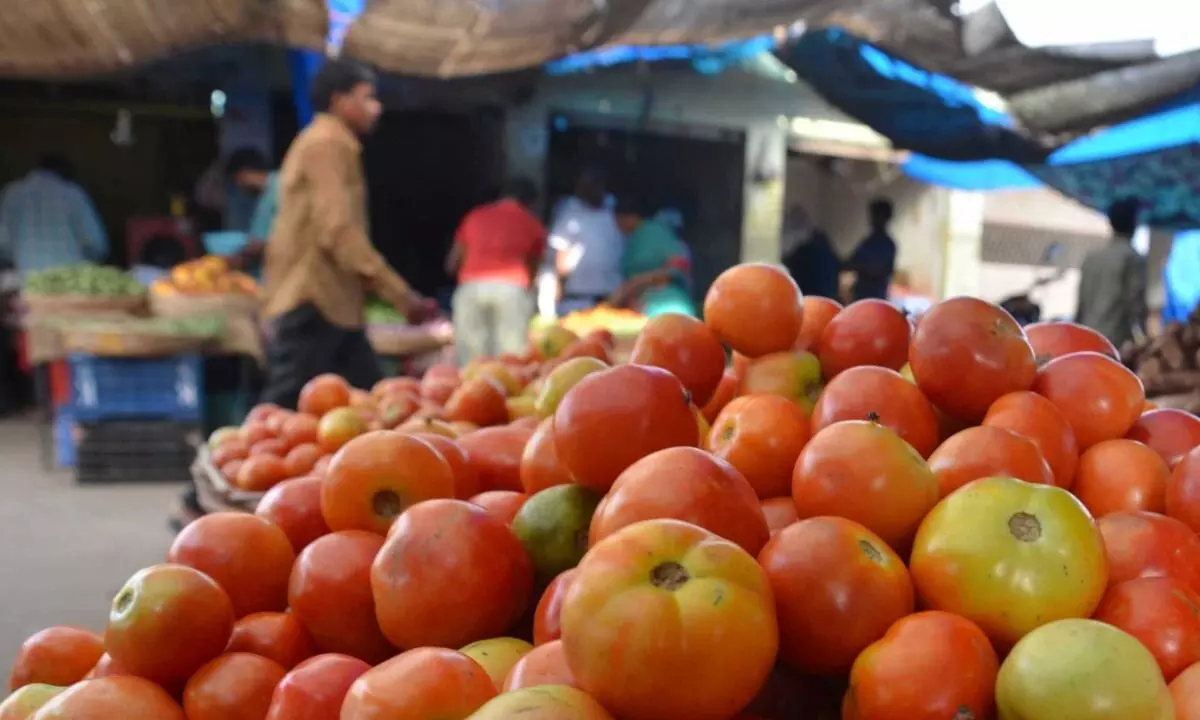Live
- Very few nations have simultaneous polls
- 2 IndiGo planes to bring stranded passengers from Istanbul
- NTR should be awarded Bharat Ratna, says CM
- Vizag mafia rules sand ramps in Srikakulam district
- Unselfishness is a Lie
- ICTPL welcomes maiden vessel MV KSL Fuyang
- BJP leaders mock Rahul's speech
- Analysing Happiness
- Two-day ToT organised for trainers
- Savarkar preferred Manusmriti to Constitution: Rahul
Just In
Hyderabad: Incessant rains spike tomotoes price;apples set to turn dearer


- Over the past two weeks, there has been a steady escalation in the prices of tomatoes and green chillies. This surge is being linked to the excessive rainfall experienced in the regions where tomatoes are cultivated
- Based on the prevailing pattern, it is anticipated that the wholesale market price of tomatoes will soon reach Rs 180-200 per kg
- The escalating costs have led consumers to explore more economical choices to manage their culinary needs during this period of tomato scarcity
Hyderabad: As the relentless downpour continues to wreak havoc across the State and various parts of the country, fears are mounting that the skyrocketing tomato and green chillies prices are just the tip of the iceberg. The incessant rainfall and devastating floods in Himachal Pradesh and Kashmir might trigger a domino effect, leading to a surge in prices of other vegetable crops and fruits, including apples. Amidst this concerning situation, climate change is being singled out as a critical factor exacerbating the precarious state of agriculture.
Over the past two weeks, there has been a steady escalation in the prices of tomatoesand green chillies. This surge is being linked to the excessive rainfall experienced in the regions where tomatoes are cultivated, coupled with unusual temperatures recorded during the month of June. Based on the prevailing pattern, it is anticipated that the wholesale market price of tomatoes will soon reach Rs 180-200 per kg.
As a consequence of this significant price hike, numerous households are reportedly adopting alternative food options such as tamarind and lemon to substitute for tomatoes in their daily menus. The escalating costs have led consumers to explore more economical choices to manage their culinary needs during this period of tomato scarcity.
The apple vendors in the city are expressing deep concern over the recent floods in Himachal Pradesh and Kashmir, which have severely impacted the apple industry in those regions. There is growing apprehension among these vendors that this unfortunate situation might result in a subsequent surge in apple prices within the city in the days to come. The disruption caused to the apple supply chain due to the floods has raised fears of a potential scarcity, leading to an imminent increase in prices for this popular fruit in the local market. Officials and farmer unions report that the catastrophe has wiped out approximately $122 million worth of fruit, leading to nearly halving the country’s apple production.
“Tomatoes, being a prominent ingredient in both vegetarian and non-vegetarian dishes, play a crucial role in the culinary culture of our society. However, the recent steep hike in tomato prices has resulted in the unfortunate situation where this essential ingredient is becoming unaffordable for many poor and lower middle-class families.”, said Madhavi a homemaker.
In light of this concerning scenario, it is imperative for the government to take proactive measures to alleviate the impact of soaring tomato prices on vulnerable communities. One effective step could be the implementation of a subsidised tomato supply programme, where the government arranges special stalls or outlets to distribute tomatoes at affordable prices, she added.
Speaking to The Hans India, a senior official in Telangana Horticulture Department said, “The decline in overall tomato production this year can be attributed to multiple factors, with two prominent reasons being adverse weather conditions and poor commercial returns for farmers in the months preceding June, as well as the previous year.
The scorching heatwaves and high temperatures experienced in April and May, coupled with delayed monsoon showers in southern India and Maharashtra, created favorable conditions for pest attacks on tomato crops. Consequently, inferior-quality varieties made their way into the markets earlier this year, leading to farmers receiving meager prices ranging from Rs 6 to 11 per kilogram between December of the previous year and April 2023.”
Withstanding these factors, climate change also played an important role says Anjal Prakash, research director and adjunct Associate Professor, ISB, Hyderabad, said, “Crop yields and quality are impacted by warming temperatures, shifting rainfall patterns, and extreme weather led by climate change. Long-lasting heat waves and droughts generate water scarcity, limiting the ability to irrigate crops, while abundant rain causes flooding and harm crops. These climatic conditions can interfere with the planting, development, and harvest of vegetables, resulting in a decrease in supply and a price increase. It is important to remember that while climate change worsens agricultural problems, it does not solely determine pricing for vegetable crops in India. Several other elements, including variations in land use, population growth, market dynamics, agricultural regulations, and supply-chain inefficiencies, are also important. It is crucial to consider a wide range of interconnected aspects and undertake thorough assessments to determine the extent of climate change’s impact on vegetable crop pricing.” Eom

© 2024 Hyderabad Media House Limited/The Hans India. All rights reserved. Powered by hocalwire.com






